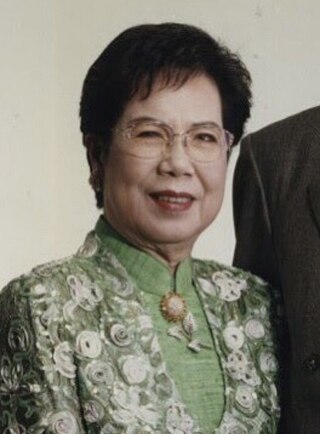Tseng Wen-hui
From Wikipedia, the free encyclopedia
Tseng Wen-hui (Chinese: 曾文惠; pinyin: Zēng Wénhuì; Pe̍h-ōe-jī: Chan Bûn-hūi; (born 31 March 1926) is a Taiwanese public figure, First Lady of the Republic of China (Taiwan) from 1988 to 2000, and widow of former Taiwanese President Lee Teng-hui.[3]
Tseng Wen-hui | |
|---|---|
| 曾文惠 | |
 | |
| 4th First Lady of Taiwan | |
| In role 13 January 1988 – 20 May 2000 | |
| President | Lee Teng-hui |
| Preceded by | Chiang Fang-liang |
| Succeeded by | Wu Shu-chen |
| 5th Second Lady of Taiwan | |
| In office 20 May 1984 – 13 January 1988 | |
| Vice President | Lee Teng-hui |
| Preceded by | Pan Ying-ching |
| Succeeded by | Hsu Man-yun |
| Personal details | |
| Born | 31 March 1926 Sanshi Village, Taihoku Prefecture, Taiwan, Empire of Japan |
| Spouse | |
| Children | 3 |
| Occupation | Homemaker, former First Lady of the Republic of China[1][2] |
Biography
Summarize
Perspective

Tseng was born on 31 March 1926 in Sanshi Village, Taihoku Prefecture, now known as present-day New Taipei City, Taiwan.
Tseng married Lee on 9 February 1949, when he was a teaching assistant in the Faculty of Agriculture and Economics at National Taiwan University.[4] The couple had three children. Their eldest son, Lee Hsien-wen, (c. 1950 – 21 March 1982)[5][6] died of sinus cancer.[7] Daughters Anna and Annie, were born c. 1952 and c. 1954, respectively.[5]
Politically, Tseng stated that she preferred to keep a low profile for her husband's sake. However, she became the subject of controversy in 2000 when New Party politicians Elmer Fung, Hsieh Chi-ta, and Tai Chi accused her of attempting to flee to New York City with a suitcase containing NT$85 million. In response, she filed a defamation suit against them on 29 March 2000, making her the only first lady in Taiwan's history to become involved in a lawsuit. The case involved the testimony of Wang Kuang-yu, which marked the first time that any Investigation Bureau director testified in a case under Investigation Bureau jurisdiction.[8] The three were cleared of charges, but Tseng appealed the verdict to the Taiwan High Court.[3] The appeal was submitted in April 2002, and the High Court began its own investigation in November.[9] In December 2003, the High Court reversed the Taipei District Court's decision. All three accusers were fined NT$81,000. Hsieh refused to pay, and was sentenced to three months imprisonment.[10]
Notes
References
Wikiwand - on
Seamless Wikipedia browsing. On steroids.
